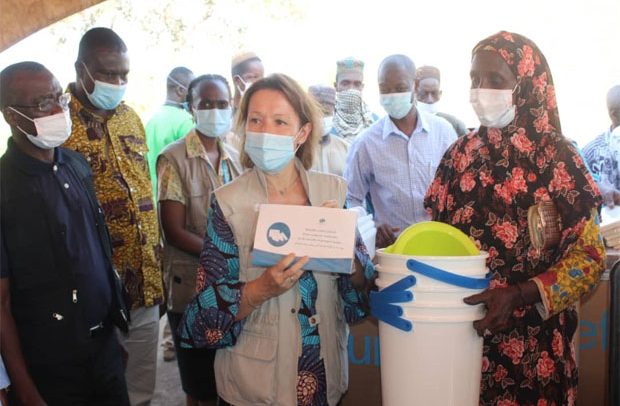UNICEF Country Representative, Anne Claire Dufey handing over the sanitary kits to Hajara Dawchi
Flood victims in the Northern, Savannah and North East regions have received Water, Sanitation and Hygiene (WASH) kits donated by the United Nations Children’s Fund (UNICEF).
The presentation included water containers, bars of soap, chlorine drop for water purification, tarpaulin, garbage bags, reusable menstrual set, vitamins, child potty and multipurpose cloth to help improve their sanitation situation and prevent the spread of communicable diseases.
Torrential rains between August and September coupled with the spilling of the Bagre Dam in Burkina Faso left parts of Northern Ghana flooded and 10 people killed.
About 1,600 people across the regions had their houses completely destroyed by the floods and are currently staying in schools, churches and temporary camps where sanitation is poor.
Making the presentation to the flood victims at one of the camps at Daboya, UNICEF Country Representative, Anne-Claire Dufay, said the sanitation kits were aimed at reducing the sanitation challenges faced by the victims while improving hygiene practices such as frequent hand washing with soap.
“During the Covid-19 pandemic, we realised how important it is to wash our hands with soap under running water; my hope is that this community has access to running water and toilet because if you continue to practise open defecation this can bring a lot of diseases and children and adults can get sick,” she said.
Savannah Regional Minister, Adam Salifu Braimah, thanked UNICEF for the gesture and said it would go a long way to alleviate the plight of the victims.
He said the government was putting in place stringent measures to relocate them to higher lands in the meantime, while for the long term it was constructing the Pwalugu Multipurpose Dam in order to harvest excess water from the spillage of the Bagre Dam and torrential rains to prevent the perennial flooding.
A flood victim, Hajara Dawchi, who received the items on behalf of the people, expressed her appreciation for the items and gave an assurance that they would put them to good use to ensure that they served their intended purposes.
By Jamila Akweley Okertchiri


